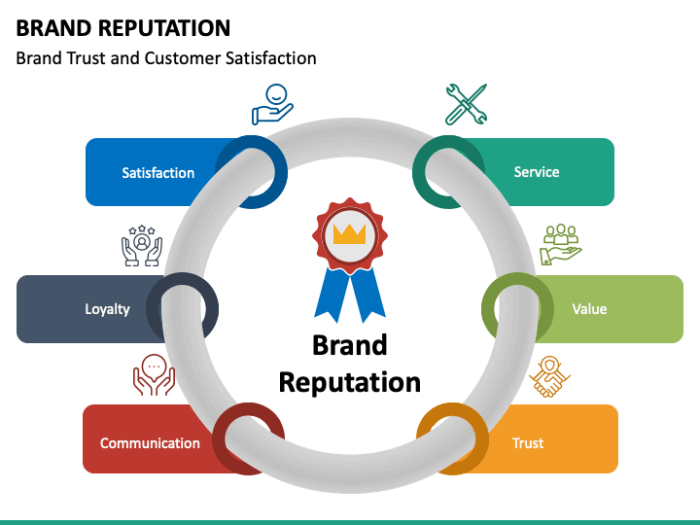
Dive into the world of enhancing brand reputation with our guide on proven strategies and tips. From building trust to leveraging social media, discover how to boost your brand’s image and credibility.
Importance of Brand Reputation
In today’s competitive business landscape, brand reputation plays a crucial role in determining the success or failure of a company. A positive brand reputation can significantly impact sales and customer loyalty, while a negative reputation can harm a business and its bottom line.
Positive Impact of Brand Reputation
- Increased Trust: A strong brand reputation builds trust among consumers, leading to higher customer retention rates and repeat business.
- Enhanced Credibility: A positive brand image makes it easier for a company to introduce new products or services, as consumers are more likely to trust the brand’s offerings.
- Competitive Advantage: Companies with a good reputation often have a competitive edge over their rivals, as consumers are more inclined to choose brands they trust and respect.
Negative Impact of Brand Reputation
- Loss of Customers: A negative brand reputation can drive customers away, resulting in a decline in sales and market share.
- Damaged Credibility: Once a brand’s reputation is tarnished, it can be challenging to regain consumers’ trust and credibility in the market.
- Legal Consequences: Negative publicity or scandals can lead to legal issues and regulatory scrutiny, impacting the company’s operations and financial health.
Recovering from a Negative Brand Reputation
- Apologize and Acknowledge Mistakes: Admitting to errors and taking responsibility for any wrongdoing can help rebuild trust with customers.
- Implement Changes: Making strategic changes to products, services, or internal processes can demonstrate a commitment to improvement and rebuilding the brand’s reputation.
- Engage with Customers: Actively engaging with customers through social media, surveys, and feedback channels can help regain trust and loyalty.
Building Trust with Customers
Building trust with customers is essential for enhancing brand reputation. It involves establishing a strong and positive relationship with your target audience, which can lead to increased loyalty and advocacy for your brand.
Role of Transparency and Authenticity
Transparency and authenticity play a crucial role in building a positive brand reputation. When customers feel that a company is honest and genuine in its interactions, they are more likely to trust the brand and develop a sense of loyalty. Being transparent about business practices, product information, and communication builds credibility and fosters trust with customers.
- Provide clear and honest information about your products or services.
- Communicate openly about any issues or challenges your brand may face.
- Engage with customers in a genuine and authentic manner.
- Be consistent in your messaging and actions to build trust over time.
Examples of Companies Building Trust
Many companies have successfully built trust with their customers, leading to a positive impact on their brand reputation. For example, Patagonia is known for its commitment to sustainability and ethical practices, which has earned the trust and loyalty of environmentally conscious consumers. Another example is Zappos, which prioritizes customer service and transparency, creating a strong bond of trust with its customers.
Building trust with customers is a long-term investment that can result in increased brand loyalty and positive word-of-mouth referrals.
Managing Online Reviews and Feedback
When it comes to managing brand reputation, monitoring and responding to online reviews and feedback play a crucial role in shaping public perception. In today’s digital age, consumers heavily rely on online reviews to make purchasing decisions, making it essential for businesses to actively engage with feedback.
Importance of Monitoring and Responding
Monitoring and responding to online reviews and feedback are vital for brand reputation management for several reasons:
- Builds trust and credibility: Addressing reviews, both positive and negative, shows that the brand values customer opinions and is committed to providing excellent service.
- Improves customer satisfaction: Acknowledging feedback and resolving issues promptly can turn dissatisfied customers into loyal advocates of the brand.
- Enhances brand visibility: Engaging with reviews can boost the brand’s online presence and attract new customers who trust the authenticity of reviews.
Handling Negative Reviews
Dealing with negative reviews requires a strategic approach to mitigate any potential damage and even turn them into positive outcomes:
- Respond promptly and professionally: Acknowledge the customer’s concerns, apologize for any shortcomings, and offer a solution to address the issue.
- Take the conversation offline: Encourage the customer to contact customer service directly to resolve the problem privately and demonstrate a commitment to customer satisfaction.
- Show empathy and understanding: Express empathy towards the customer’s experience and show willingness to make things right, showcasing the brand’s human side.
- Monitor and learn from feedback: Use negative reviews as constructive criticism to identify areas for improvement and implement changes to prevent similar issues in the future.
- Ask for feedback proactively: Reach out to customers after a purchase or service interaction and request their feedback, making it easy for them to share their experience.
- Incentivize reviews: Offer discounts, exclusive offers, or loyalty points to customers who leave positive reviews, incentivizing them to share their positive experiences.
- Create a seamless review process: Simplify the review submission process by providing clear instructions and links to review platforms, making it convenient for customers to leave feedback.
- Consistent brand messaging helps in reinforcing key brand values and attributes.
- It ensures that the brand’s identity remains intact across various touchpoints.
- Customers are more likely to remember and recognize a brand that maintains consistent messaging.
- It helps in creating a seamless and coherent brand experience for customers.
- Apple: Known for its sleek and innovative products, Apple maintains a consistent brand message of simplicity, elegance, and cutting-edge technology.
- Nike: With its “Just Do It” slogan, Nike has built a strong brand message around empowerment, motivation, and athleticism.
- Coca-Cola: Coca-Cola’s consistent messaging around happiness, togetherness, and refreshment has helped it become one of the most recognizable brands in the world.
- Develop a brand style guide that Artikels key messaging points, brand voice, tone, and visual elements.
- Train employees and stakeholders on the importance of consistent brand messaging and provide them with the tools and resources to maintain it.
- Audit all marketing materials and channels regularly to ensure that they align with the brand’s messaging guidelines.
- Use storytelling to convey the brand’s message in a compelling and consistent way across different platforms.
- Enhanced Credibility: When influencers promote a brand, their followers are more likely to trust and engage with the content, leading to a positive perception of the brand.
- Increased Reach: Influencers have a dedicated following that can help a brand reach a larger audience that may not have been accessible through traditional marketing channels.
- Authenticity: Influencers can create content that resonates with their audience, providing a more authentic and relatable way to showcase a brand’s products or services.
- Engagement: Collaborating with influencers can drive higher levels of engagement, as their followers are often more actively involved and interested in the content they share.
- Consistent Brand Voice: Ensure that your brand’s voice and messaging are consistent across all social media platforms to maintain a cohesive brand image.
- Engage with Your Audience: Respond to comments, messages, and mentions promptly to show that you value customer feedback and are actively listening to your audience.
- Create Valuable Content: Share relevant and engaging content that adds value to your audience’s lives, whether it’s informative articles, entertaining videos, or inspiring stories.
- Showcase Your Company Culture: Give followers a glimpse behind the scenes of your company to humanize your brand and build a stronger connection with your audience.
- Utilize Visuals: Incorporate high-quality images, videos, and graphics into your social media posts to capture attention and convey your brand’s personality effectively.
- Train your customer service team: Ensure that your customer service team is well-trained and equipped to handle various customer inquiries and issues effectively.
- Listen to your customers: Actively listen to customer feedback and address their concerns promptly to show that you value their opinions.
- Personalize the customer experience: Tailor your interactions with customers to make them feel valued and appreciated.
- Go above and beyond: Surprise and delight your customers by exceeding their expectations and providing exceptional service.
- Be transparent and honest: Communicate openly with customers, especially in times of crisis, to maintain their trust and confidence in your brand.
- Increases credibility: User-generated content is seen as more trustworthy and genuine compared to branded content, as it comes directly from real customers.
- Engages the audience: Encouraging users to share their experiences with the brand can create a sense of community and engagement, leading to a stronger connection with the audience.
- Improves brand visibility: User-generated content can help increase brand awareness and reach a wider audience through social media shares and online reviews.
- Cost-effective marketing: User-generated content is often created for free by customers, saving the brand money on advertising and content creation.
- Authenticity and trust: User-generated content adds authenticity to the brand’s image and helps build trust with potential customers.
- Increased engagement: User-generated content can drive higher levels of engagement on social media platforms and encourage user interaction.
- Utilizing and SEM techniques to improve search engine rankings and increase website traffic.
- Implementing targeted social media campaigns to engage with customers and promote products or services.
- Utilizing email marketing to nurture leads, build relationships, and encourage repeat purchases.
- Creating compelling content such as blogs, videos, and infographics to educate and inform customers.
- Personalizing the customer experience through tailored recommendations and targeted messaging.
- Utilizing data analytics to track customer behavior, preferences, and trends for informed marketing decisions.
- Implementing a multi-channel marketing approach to reach customers across various platforms and devices.
- Collaborating with influencers and brand ambassadors to reach new audiences and build credibility.
- Traditional Advertising Channels: This includes TV commercials, radio ads, print media, and billboards. These channels reach a wide audience but may not offer the same level of targeting as digital channels.
- Digital Advertising Channels: Digital advertising encompasses online platforms such as social media, search engines, websites, and email marketing. These channels allow for precise targeting and personalized messaging to specific audience segments.
- Influencer Marketing: Leveraging influencers to promote products or services can be a powerful advertising strategy, especially on social media platforms where influencers have a loyal following.
- Apple’s “Get a Mac” Campaign: This series of ads featuring Justin Long and John Hodgman humorously compared Mac computers to PCs, positioning Mac as the cooler and more innovative choice.
- Dove’s “Real Beauty” Campaign: Dove’s campaign challenged beauty stereotypes and celebrated diversity, resonating with consumers and reinforcing Dove’s commitment to inclusivity.
- Nike’s “Just Do It” Campaign: Nike’s iconic slogan became synonymous with motivation and empowerment, inspiring athletes and consumers worldwide to push their limits and pursue their dreams.
- Affiliate marketing helps increase brand visibility by leveraging the audience of affiliate partners.
- Businesses can reach new and diverse audiences through affiliate partnerships, enhancing brand recognition.
- Affiliate marketing can boost credibility as customers are more likely to trust recommendations from affiliates they follow.
- It provides a cost-effective way to promote products or services, as businesses only pay affiliates for successful referrals or sales.
- Amazon Associates: Amazon’s affiliate program has been highly successful in driving sales and increasing brand exposure for the e-commerce giant.
- Rakuten Marketing: Rakuten’s affiliate network has helped numerous brands expand their reach and improve their brand reputation through affiliate partnerships.
- Bluehost Affiliate Program: Bluehost’s affiliate program has been effective in driving conversions and enhancing brand credibility in the web hosting industry.
- Define Your Brand Identity: Clearly articulate your brand values, mission, and vision to establish a strong foundation for your branding efforts.
- Consistent Visual Identity: Use consistent colors, logos, and design elements across all channels to create a cohesive brand image.
- Tell a Compelling Story: Develop a brand narrative that resonates with your target audience and showcases what sets your brand apart.
- Engage with Your Audience: Build relationships with customers through personalized interactions, storytelling, and engaging content.
- Monitor and Adapt: Regularly evaluate your branding efforts, gather feedback, and make adjustments to ensure your brand remains relevant and resonates with consumers.
- Direct marketing campaigns can help brands gather valuable data on customer preferences and behaviors, allowing for more targeted and effective marketing strategies.
- By delivering personalized messages directly to consumers, brands can create a sense of exclusivity and importance, strengthening the relationship with customers.
- Direct marketing initiatives can also help brands address customer concerns or issues promptly, showing a commitment to customer satisfaction and building a positive brand image.
- Personalized direct marketing can lead to higher conversion rates and increased sales by delivering tailored messages that resonate with individual preferences.
- By addressing customers by name and referencing their past interactions with the brand, personalized direct marketing can create a sense of familiarity and trust.
- These strategies can also help brands stand out in a crowded marketplace by offering unique and relevant content that captures the attention of consumers.
-
Amazon’s personalized recommendation emails, which suggest products based on customers’ browsing and purchase history, have helped increase customer engagement and loyalty.
-
Dollar Shave Club’s targeted direct mail campaigns, offering personalized grooming recommendations and discounts, have effectively attracted and retained customers while strengthening brand loyalty.
-
Coca-Cola’s “Share a Coke” campaign, featuring personalized bottles with customers’ names, generated a buzz on social media and increased brand visibility and engagement.
- Social Media Marketing: Platforms like Facebook, Instagram, and Twitter allow businesses to connect with their audience, share valuable content, and build relationships that enhance brand reputation.
- Search Engine Optimization (): By optimizing their website for search engines, businesses can improve their online visibility, attract more traffic, and establish credibility in their industry.
- Email Marketing: Sending targeted and personalized emails to customers can help businesses stay in touch, provide value, and strengthen brand loyalty.
- Content Marketing: Creating and distributing valuable content such as blogs, videos, and infographics can position a business as an industry leader and build trust with customers.
-
Apple’s “Shot on iPhone” Campaign:
By encouraging customers to share their own photos taken with an iPhone, Apple created a community of brand advocates and showcased the quality of their product.
-
Dove’s Real Beauty Campaign:
Through powerful videos and social media engagement, Dove promoted body positivity and self-acceptance, resonating with their audience and boosting brand reputation.
-
Old Spice’s “The Man Your Man Could Smell Like” Campaign:
This viral campaign used humor and creativity to attract attention, engage customers, and revitalize the brand image, leading to increased sales and brand loyalty.
- Mailing lists provide a direct channel of communication with customers, allowing businesses to share updates, promotions, and valuable content.
- By segmenting mailing lists based on customer preferences and behaviors, businesses can tailor their messages for more personalized and targeted marketing.
- Regularly engaging with subscribers through email helps maintain brand visibility and fosters brand loyalty over time.
- Offer an incentive for signing up to encourage more subscribers to join your mailing list.
- Use email automation to send targeted messages based on subscriber actions and interests.
- Keep your emails visually appealing and mobile-responsive to increase engagement and readability.
- Amazon: Amazon sends personalized product recommendations and exclusive deals to subscribers based on their browsing and purchase history.
- Airbnb: Airbnb uses segmented mailing lists to send tailored travel suggestions and promotions to different customer segments.
- Sephora: Sephora’s mailing list includes beauty tips, tutorials, and product recommendations that cater to their diverse customer base.
Encouraging Positive Reviews
To encourage satisfied customers to leave positive reviews and feedback online, businesses can implement the following strategies:
Consistent Brand Messaging
Maintaining consistent brand messaging across all channels is crucial for building and maintaining a strong brand reputation. Consistency helps in creating a clear and cohesive brand image, making it easier for customers to identify and connect with the brand. It also builds trust and credibility among customers, as they know what to expect from the brand regardless of where they interact with it.
Significance of Consistent Brand Messaging
Companies with Strong Brand Messaging
Tips for Ensuring Consistency in Brand Messaging
Using Influencer Marketing
Influencer marketing has become a powerful tool for brands looking to improve their reputation in the digital age. By collaborating with influencers, companies can leverage their credibility and reach a wider audience in a more authentic and engaging way.
Benefits of Collaborating with Influencers
Examples of Successful Influencer Marketing Campaigns
One notable example is the partnership between Daniel Wellington and various fashion influencers. By having influencers showcase their watches on social media platforms, Daniel Wellington was able to significantly increase brand awareness and sales.
Another successful campaign was the collaboration between Nike and professional athletes like Serena Williams and Cristiano Ronaldo. These partnerships not only boosted Nike’s brand reputation but also positioned the brand as a leader in the sports industry.
Leveraging Social Media for Brand Reputation

In today’s digital age, social media plays a crucial role in shaping a brand’s reputation. With millions of users active on various platforms, it is essential for companies to leverage social media effectively to enhance their brand image and connect with their audience.
Tips for Creating a Positive Brand Image on Social Media Platforms
Companies Effectively Leveraging Social Media for Brand Reputation
| Company | Strategy |
|---|---|
| Nike | Engages with customers through interactive campaigns, user-generated content, and influencer partnerships to strengthen brand loyalty. |
| Dove | Employs inclusive messaging and impactful social campaigns to promote body positivity and diversity, resonating with their audience. |
| Starbucks | Encourages user-generated content, responds to customer feedback, and shares behind-the-scenes stories to create a sense of community among followers. |
Customer Service and Brand Reputation

Customer service plays a crucial role in shaping a brand’s reputation. It is the direct interaction between the brand and its customers, which can significantly impact how the brand is perceived in the market. Exceptional customer service can help build trust, loyalty, and advocacy among customers, leading to a positive brand reputation.
Strategies for Providing Exceptional Customer Service
Impact of Customer Service on Brand Loyalty and Advocacy
Exceptional customer service can lead to increased brand loyalty and advocacy. When customers have a positive experience with a brand’s customer service, they are more likely to become repeat customers and recommend the brand to others. This, in turn, can help enhance the brand’s reputation and attract new customers through positive word-of-mouth.
Incorporating User-Generated Content
User-generated content refers to any form of content created by consumers or users of a brand, such as reviews, testimonials, social media posts, and videos. Incorporating user-generated content into marketing strategies can significantly boost brand reputation in several ways.
Boosting Brand Reputation
User-generated content provides authentic and unbiased perspectives on a brand, which can help build trust and credibility with potential customers. When people see positive reviews or testimonials from real users, they are more likely to trust the brand and consider making a purchase. This can ultimately enhance the brand’s reputation and increase customer loyalty.
Benefits of Incorporating User-Generated Content
There are several benefits to incorporating user-generated content in marketing strategies:
Examples of Brands Utilizing User-Generated Content
Many brands have successfully utilized user-generated content to enhance their brand reputation. For example:
Starbucks encourages customers to share their photos with the hashtag #mystarbucks on social media, showcasing user-generated content on their website and social channels.
Lululemon features customer testimonials and reviews on their website, highlighting real-life experiences and feedback from their loyal customers.
Dove’s “Real Beauty” campaign invited women to share their stories and photos, creating a powerful movement that resonated with audiences worldwide.
MARKETING E-COMMERCE
In today’s digital age, marketing plays a crucial role in the success of e-commerce businesses. It is essential for building brand awareness, attracting customers, and ultimately improving brand reputation in the competitive online marketplace.
Significance of Marketing in E-Commerce
Marketing in the e-commerce sector is vital for creating visibility amidst the vast online landscape. It helps businesses reach their target audience, drive traffic to their websites, and generate leads that can convert into sales. Effective marketing strategies can differentiate a brand from its competitors and establish a strong online presence, leading to increased credibility and trust among customers.
Successful E-Commerce Marketing Strategies
To improve brand reputation, e-commerce businesses can implement the following strategies:
Examples of E-Commerce Companies with Strong Marketing Strategies
One notable example is Amazon, known for its personalized recommendations, user-generated reviews, and targeted email marketing campaigns. Amazon’s strategic use of data analytics and AI algorithms has enabled them to deliver a seamless shopping experience and build customer loyalty.Another example is Shopify, a leading e-commerce platform that empowers businesses to create customizable online stores. Shopify’s marketing strategies focus on educating and supporting their customers through informative blogs, webinars, and community forums, establishing them as a trusted resource in the e-commerce industry.Overall, e-commerce companies that prioritize marketing efforts to enhance brand reputation can effectively engage customers, drive sales, and build a loyal customer base in the competitive online market.
ADVERTISING
Advertising plays a crucial role in shaping brand reputation by creating awareness, influencing perceptions, and building a strong brand image in the minds of consumers.
Types of Advertising Channels and Their Impact
Examples of Successful Advertising Campaigns
AFFILIATE MARKETING
Affiliate marketing is a powerful strategy that can significantly contribute to improving brand reputation. By partnering with affiliates, businesses can expand their reach, increase brand exposure, and build credibility among their target audience.
Benefits of Affiliate Marketing Partnerships
Examples of Successful Affiliate Marketing Programs
BRANDING
Branding plays a crucial role in building a strong brand reputation. It is the essence of what your company stands for, how it is perceived by customers, and the values it represents. Effective branding helps create a unique identity for your business, differentiate it from competitors, and build trust and loyalty among consumers.
Strategies for Effective Branding
Examples of Successful Branding Initiatives
Apple: Known for its sleek design, user-friendly interface, and innovative technology, Apple has built a strong brand reputation that resonates with consumers worldwide.
Nike: With its iconic “Just Do It” slogan and emphasis on performance and athleticism, Nike has successfully positioned itself as a leading sports and lifestyle brand.
Coca-Cola: Through its timeless logo, memorable advertising campaigns, and focus on creating emotional connections with consumers, Coca-Cola has established itself as a global brand with a strong reputation.
DIRECT MARKETING
Direct marketing plays a crucial role in improving brand reputation by allowing companies to communicate directly with their target audience. This form of marketing enables personalized interactions that can enhance customer relationships and build trust.
Role of Direct Marketing in Brand Reputation
Direct marketing helps brands establish a direct line of communication with customers, allowing for personalized messages that resonate with individuals on a more personal level. By targeting specific segments of the population, companies can tailor their marketing efforts to address the unique needs and preferences of their audience. This personalized approach can lead to increased customer loyalty and positive brand perception.
Benefits of Personalized Direct Marketing
Personalized direct marketing strategies offer several benefits for building customer relationships and improving brand reputation. These strategies can help companies connect with customers on a more personal level, leading to increased engagement and loyalty.
Successful Direct Marketing Campaigns
Several brands have successfully utilized direct marketing campaigns to enhance their brand reputation and connect with customers on a deeper level. Examples include:
INTERNET MARKETING
Internet marketing plays a crucial role in helping businesses improve their brand reputation by increasing visibility, reaching a wider audience, and engaging with customers on various online platforms.
Various Internet Marketing Channels
Successful Internet Marketing Campaigns
MAILING LISTS
Mailing lists play a crucial role in brand reputation management by allowing businesses to directly reach out to their target audience and build relationships with customers.
Importance of Mailing Lists in Brand Reputation Management
Tips for Effectively Utilizing Mailing Lists for Targeted Marketing
Examples of Companies Leveraging Mailing Lists Successfully
Final Wrap-Up
In conclusion, by implementing these tactics and staying consistent, you can elevate your brand reputation to new heights, attracting more customers and solidifying your place in the market. Take charge of your brand’s narrative and watch your reputation soar!
FAQ Summary
How can I recover from a negative brand reputation?
To recover from a negative brand reputation, you need to acknowledge the issues, address them transparently, and focus on rebuilding trust through consistent positive actions.
Why is user-generated content important for brand reputation?
User-generated content adds authenticity and credibility to your brand, as it showcases real experiences and testimonials from satisfied customers.
How can I encourage customers to leave positive reviews online?
You can encourage customers to leave positive reviews by providing exceptional customer service, asking for feedback, and offering incentives for their reviews.





